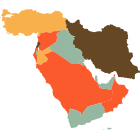External Impact Evaluation of the Bekaa Water Management Project in Lebanon - SDC
Background
Since the onset of the Syrian conflict in 2011, Lebanon’s Bekaa Valley experienced a significant influx of refugees, nearly doubling its population. This surge placed immense pressure on the already fragile water management infrastructure, underscoring the urgent need for improved water access, quality, and wastewater management. The Bekaa Water Management Project (BWMP), managed by the Bekaa Water Establishment and supported by the Swiss Agency for Development and Cooperation (SDC), was initiated to address these challenges. It aimed to provide improved, sustainable water and sanitation services to the most vulnerable communities in the region, including Syrian refugees, Palestinian refugees from Syria, and Lebanese returnees.
The socio-economic situation in Lebanon deteriorated since October 2019, with soaring inflation rates further straining the capacity of local water management services. These challenges underscored the critical role of effective water governance and infrastructure resilience in crisis settings. Triangle evaluated the BWMP to assess the impacts of these efforts, identify operational strengths and gaps, and provide actionable insights to enhance the project’s effectiveness and sustainability as it prepared for its next phase.
Triangle’s Evaluation
Triangle evaluated the BWMP across its two initial phases, focusing on the project’s ability to meet the increased demand for water services due to the refugee crisis and local needs. The evaluation explored the project’s impact on the strategic management, operational efficiency, and stakeholder relationships of the Bekaa Water Establishment. It also assessed improvements in the technical efficiency of water and wastewater infrastructure.
Objectives
The evaluation of the Bekaa Water Management Project had several key objectives:
- Assess Project Alignment and Impact: To critically assess the relevance, effectiveness, coherence, and sustainability of the project’s support to the Bekaa Water Establishment during its operational phases from 2015-2023.
- Identify Challenges and Successes: To identify challenges and successes the project faced in improving water management and sanitation services in the Bekaa Valley.
- Analyze Contextual Impacts: To analyze how Lebanon’s economic conditions and regional crises affected the project’s implementation and outcomes.
- Evaluate Project Design and Management: To assess the design, implementation approach, and management arrangements of the project, determining factors that contributed to or hindered the achievement of desired results.
- Formulate Recommendations: To provide actionable recommendations based on identified successes and challenges to inform future phases of the project and other similar initiatives. This included evaluating the long-term sustainability and effectiveness of the project outcomes.
Research Approach & Methodology
Triangle employed a comprehensive mixed-method approach to conduct this evaluation. The methodology included the following key components:
- Theory of Change Analysis: Triangle reconstructed the project’s theory of change through interviews with stakeholders, reviews of project documentation, and discussions with project staff. This process aimed to clarify the project’s initial assumptions, intended outcomes, and the logic behind its interventions.
- Sector Risk Assessment: The evaluation team conducted a risk assessment focused on the water management sector within the context of Lebanon’s complex socio-economic environment. This analysis helped to identify the risks and vulnerabilities affecting the project’s stakeholders and their capacity to manage water resources effectively.
- OECD-DAC Criteria Framework: Building on insights from the theory of change and sector risk assessments, Triangle developed a tailored set of inquiries grounded in the OECD-DAC criteria, with particular attention to evaluating the project’s sustainability and its approach to gender considerations. This framework guided the systematic collection and analysis of data to ensure a holistic understanding of the project’s impact and areas for improvement.
Project:
External Impact Evaluation of the Bekaa Water Management Project in Lebanon – SDC

Duration:
February 2024 – June 2024
Lebanon
